- Crohn’s disease is a chronic inflammatory bowel disease (IBD) that primarily affects the gastrointestinal tract.
- Crohn’s disease can affect any part of the digestive tract, from the mouth to the anus, but it most commonly affects the small intestine and the beginning of the large intestine (colon).
There is no doubt that stomach problems can be normal as well as a sign of some serious disease. One such disease is Crohn’s. Abdominal Pain, Diarrhoea and other symptoms stated in the article can be signs of Crohn’s disease entering the body. As a result, it is essential that the pertinent information on this disease be preserved. In this article, learn about the causes, symptoms, and risk factors of Crohn’s disease. This article also discussed how to prevent Crohn’s disease. Also, information on how to treat Crohn’s disease is given.
What is Crohn’s Disease?
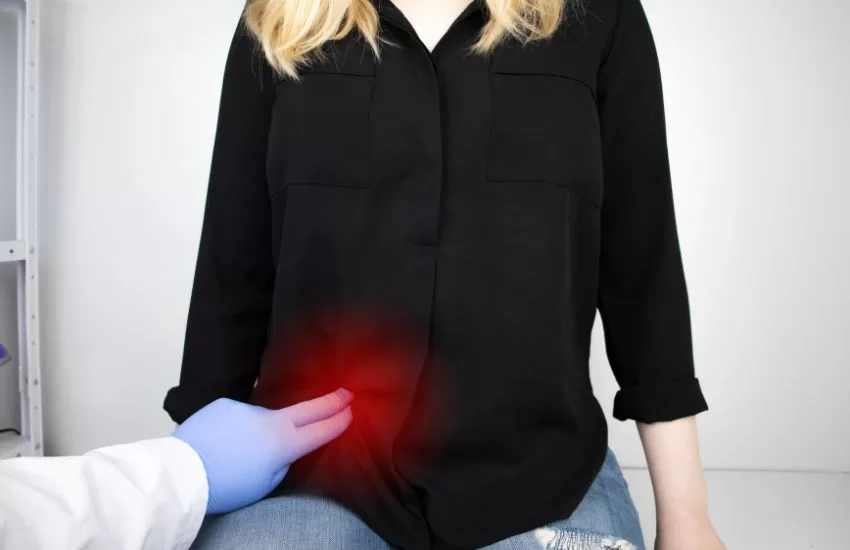
An inflammatory bowel disorder affecting the gut that falls within the category of chronic disease is called Crohn’s. An individual’s digestive tract becomes inflamed and irritated as a result. The small intestine and the early large intestine are typically affected by the condition. But Crohn’s disease can impact any component of the digestive system, from the mouth to the anus. The disease progresses slowly over time. However, for a while in between, its symptoms get a little better.
Types of Crohn’s Disease, Managing Crohn’s Disease
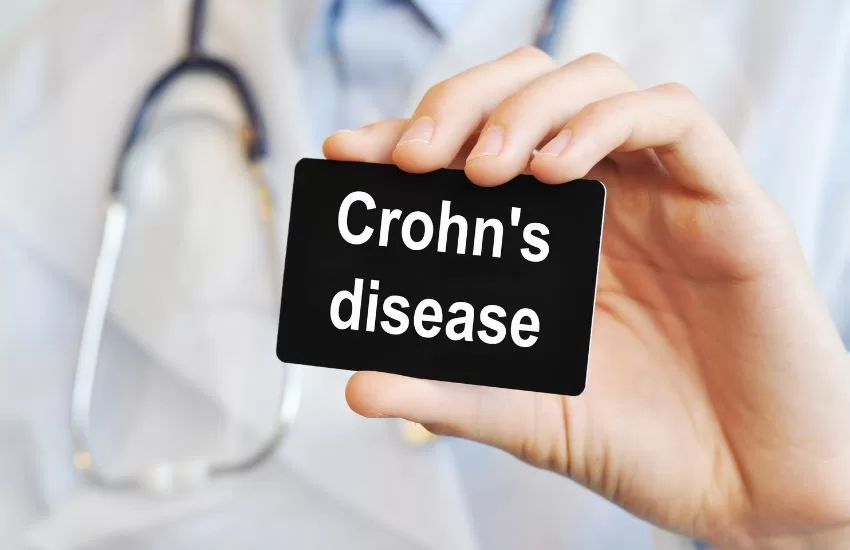
There are five different forms of Crohn’s disease:
1. Ileocolitis:
This is a common type of Crohn’s. This affects the sufferer’s colon (a section of the intestine) and ileum (the final segment of the small intestine).
2. Jejunoileitis:
It usually affects the jejunum, the middle part of the small intestine.
3. Ileitis:
This type of Crohn’s disease affects the ileum, the last part of the small intestine. This causes inflammation in the ileum.
4. Gastroduodenal Crohn’s Disease:
The stomach and duodenum (the first part of the small intestine) are both impacted by this form of Crohn’s disease.
5. Crohn’s (Granulomatous) Colitis:
This type of Crohn’s disease affects the colon, which is the main part of the large intestine.
Causes of Crohn’s, Symptom Recognition, Treatment Options
It is challenging to pinpoint the exact cause of Crohn’s disease. Its precise cause has not yet been determined. For the following reasons, according to the doctor.
1. Autoimmune Reaction
In this problem, the body’s immune system starts damaging healthy cells. This immunological response is thought to be brought on by bacteria in the digestive tract, and it can result in Crohn’s disease symptoms like inflammatory bowel disease.
2. Genetic
It is believed that Crohn’s disease may also be genetic. A person may develop Crohn’s disease if either of their parents or siblings has the condition.
3. Other Causes
Crohn’s disease can also be caused by smoking, nonsteroidal anti-inflammatory drugs (such as birth control pills or aspirin) and a high-fat diet.
Symptoms of Crohn’s Disease
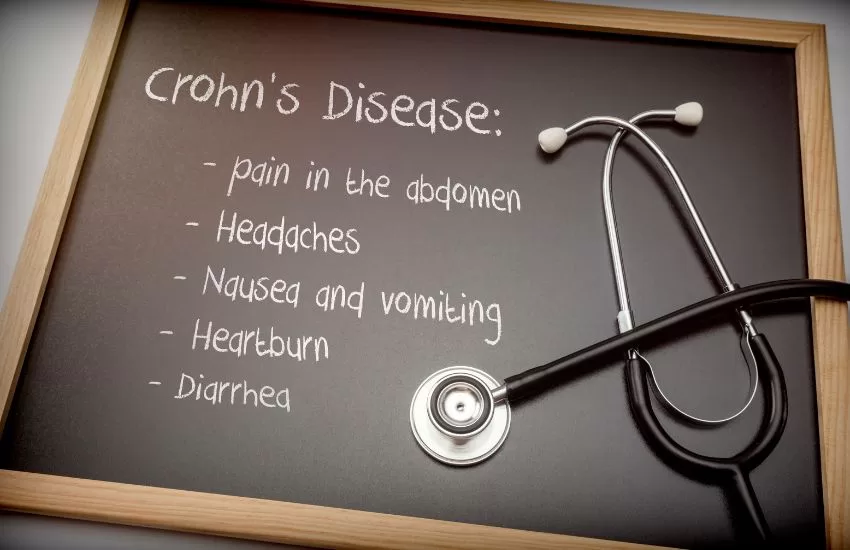
- Diarrhea
- Abdominal pain and cramps
- Weight loss
Apart from this, the symptoms of Crohn’s disease can also be something else, such as: - Lack of blood (anemia)
- Redness or pain in the eyes
- Tiredness
- Headaches
- Nausea and vomiting
- Heartburn
- Fever
- Joint pain or stiffness
- Nausea or loss of appetite
How to Diagnose Crohn’s Disease?
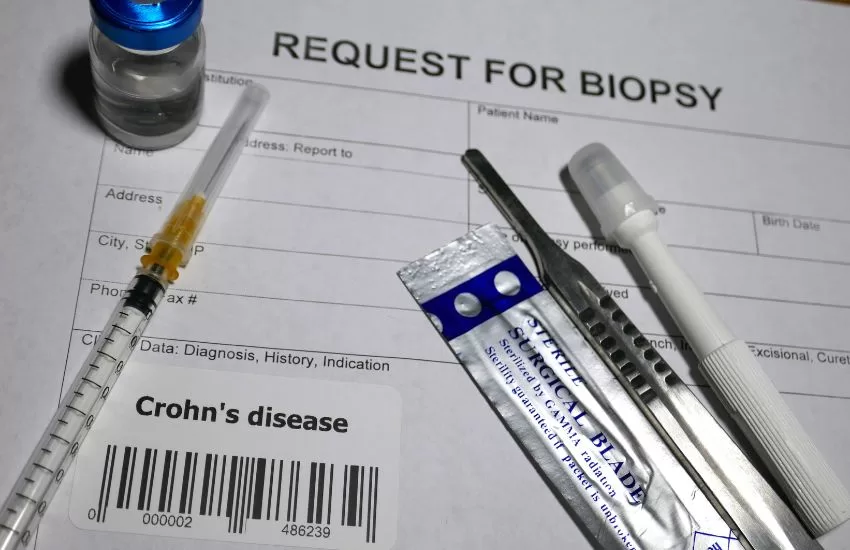
A number of different tests are needed to diagnose Crohn’s disease. This is because its symptoms are similar to those of many other diseases.
Initial Assessment
During the initial assessment, your doctor will ask you about the pattern of symptoms and investigate the cause. These may include:
- Diet
- Recent travel – eg if you have had diarrhea while traveling abroad
- If you are taking any over the counter medicine
- If you have a history of Crohn’s disease in your family
Your doctor may perform a number of standard tests to assess your general health status as - Check your pulse
- Blood pressure check
- Measurements of your weight and height
- Measurement of temperature
- Abdominal test
1. Blood Test
Your doctor may advise you to get blood tests done several times. It is used to assess the following problems:
- Finding out how much inflammation is there in your body
- To detect infection
- If you are anemic (decrease in the number of red blood cells) due to
Malnutrition has become a problem
2. Stool sample
Additionally, you might be required to submit a sample of your faeces. In which blood and mucus are examined. This is done to determine whether your symptoms are due to a parasitic infection such as roundworm or another infection.
After giving a stool and blood sample, you are referred to a gastroenterologist (specialist in digestive system problems) who will discuss your test results with you and ask for the following tests, if needed.
3. Colonoscopy
Colonoscopy is a probe used to examine the inside of the colon. In this, a long flexible tube called an endoscope is inserted from your rectum into your colon.
A light and camera are attached to one end of the endoscope. This camera sends pictures to the TV screen. It shows the level of inflammation inside the colon.
The endoscope is fitted with surgical instruments that can be used to take a number of small tissue samples from different parts of your digestive tract. This is called a biopsy. A little discomfort may be felt during this procedure but there is no pain.
These tissue samples are examined under a microscope to look for changes in the cells that occur in Crohn’s disease.
4. Wireless Capsule Endoscopy
Wireless capsule endoscopy is a newer type of test in which a small capsule (about the size of a large vitamin tablet) is given to the patient to swallow. The capsule travels down to your small intestine where it transmits images to a recording device attached to a belt or small shoulder bag.
A few days after the test, the capsule comes out in your stool. The capsule is disposable so you should not be concerned about it getting stuck in the stool.
Since this is a new test, it is available only in limited places. In some cases, an MRE or CTE scan is performed instead of capsule endoscopy.
5. MRE and CTE Scans
Magnetic resonance enterography/enteroclysis (MRE) or computerized tomography (CT) to examine the small bowel in people suspected of having Crohn’s disease
A scan called enterography) / enteroclysis (CTE) can be used.
Before having these scans, you will either be asked to drink a harmless liquid called a contrast agent (enterography), or a contrast agent may be placed into your nose through a tube that goes into your small intestine (enteroclysis). ). This contrast agent helps the small intestine to show up more clearly during the scan.
6. Small Bowel Enema or Small Bowel Follow-Through
Small Bowel Enema (SBE) and Small Bowel Follow Throw (SBFT) are two similar tests that are used to examine the entire inside of the small intestine, specifically the place where it meets the colon. Sometimes this test is also used because only 20 cm of the colon is visible during colonoscopy.
Local anesthetic to numb the inside of the nose and throat during SBE or SBFT (local anesthetic) is used. A tube is inserted through your nose and throat before the bowel. It feels uncomfortable initially but some people experience a tingling sensation after a few minutes.
A harmless liquid called barium is inserted through the bottom of the tube. Your small intestine’s lining is coated with barium to make it visible on X-rays. Then several pictures are taken from the X-ray. In this, the areas of inflammation and narrowing due to Crohn’s disease are clearly visible.
After the test, you will be advised to drink plenty of fluids to flush the barium out of your body. You may have white stools for a few days after SBE or SBFT. This is completely normal and nothing to worry about
Also read: PCOD and PCOS: Causes, Symptoms, & 7 Effective Treatment
Crohn’s Disease Treatment
The symptoms of Crohn’s disease are not the same in everyone. Additionally, it depends on the location of the disease in the digestive tract and its severity. There are various signs that can be widespread, including:
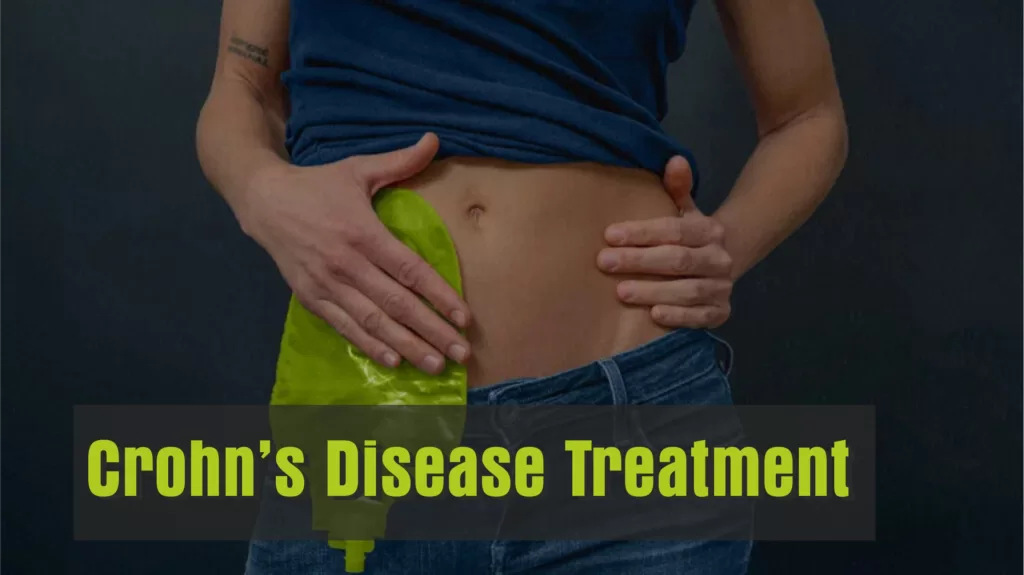
Talking about the Crohn’s disease treatment, its treatment does not work the same for everyone. The major goal of these treatments is to lessen its symptoms. There are three ways to administer these therapies.
- With the help of wires
- By relaxing the bowels
- Surgery
With the Help of Medicines
The following medications can be used to treat the symptoms of Crohn’s disease:
1. Aminosalicylates
These medicines contain a specific type of acid (5-ASA), which can help reduce inflammation. It can also have some side effects, such as:
• Diarrhea
• Headache
• Heartburn
• Nausea and Vomiting
• Abdominal Pain
2. Corticosteroids
These medications help reduce autoimmune reactions and inflammation, which may help reduce the symptoms of Crohn’s disease. It can also have side effects, such as:
- Acne
- High Blood Pressure
- High Blood Sugar
- Decreased Bone Density
- Risk of Infection
- Mood Swing
- Gaining Weight
3. Immunomodulators
These medications reduce the autoimmune response, which can help reduce inflammation. It may take a few weeks to three months for these to work properly. These medicines are given to those on whom no other medicine works. The following are a few of its negative effects
- Decreased white blood cells, which can make an infection more likely.
- Tiredness
- Vomit
- Pancreatitis (Inflammation of the pancreas)
4. By Relaxing the Bowels
If the symptoms of Crohn’s disease are more severe, bowel rest can also be used as a treatment option in addition to medications. The doctor may suggest drinking certain unique beverages in this situation. This can be done as follows:
- Consumption of nutrient rich beverages.
- Delivery of nutrient-rich beverages through a tube to the stomach or small intestine.
- delivering specific nutrients to the body via blood.
5. Surgery
Crohn’s disease can also be treated through surgery. This procedure can lessen illness complications and help with symptom improvement. Under some conditions, such as those listed below, doctors may advise surgery as part of the Crohn’s disease treatment:
- Due to fistula (an unnatural joint between two parts of the body)
- Life-threatening bleeding
- Stricture of the bowel (inability to pass food, drink, air or stool through the bowel)
- Life-threatening side effects of medicines
- When medication does not improve symptoms.
Along with treatment, maintaining a healthy diet is crucial. Therefore, after the treatment of Crohn’s disease, know which foods can be included in the diet during Crohn’s disease.
Crohn’s Disease Diet
Only the doctor can provide accurate advice regarding what to eat in the diet according to the type of Crohn’s disease. But this might be a good moment to take care of any diet-related issues. When you are planning on Crohn’s Disease Diet, you should consdider these points:
- Don’t drink soda beverages.
- Eat less high-fiber food, such as popcorn, almonds, etc.
- Drink more fluids.
- Don’t eat a lot at once.
- The doctor may advise a high-calorie, lactose-free, low-fat, low-fiber, or low-salt diet depending on the issue.
Prevention Tips for Crohn’s Disease
An example of an inflammatory bowel disease is Crohn’s disease, which was already addressed in the article. In this case, inflammatory bowel disease prevention advice can help people avoid developing Crohn’s disease.
These tips are explained below :
1. Don’t smoke
2. Get necessary vaccinations done. This can reduce the risk of infection.
3. Exercise and do some physical activity everyday.
4. Take a balanced diet.
5. Avoid anemia
6. Avoid drugs that can cause Crohn’s disease, such as nonsteroidal anti-inflammatory drugs.
Disclaimer : The article’s sole purpose is to wake you up for your health and to provide you the best collective and verified information. We do not recommend for any kind of medicine or treatment. You should only seek to your Doctor or Medical Counselor Because there is no one better than him.
1 thought on “Crohn’s Disease: Unmasking Symptoms, Causes, Diagnosis, & 7 Potent Treatments”